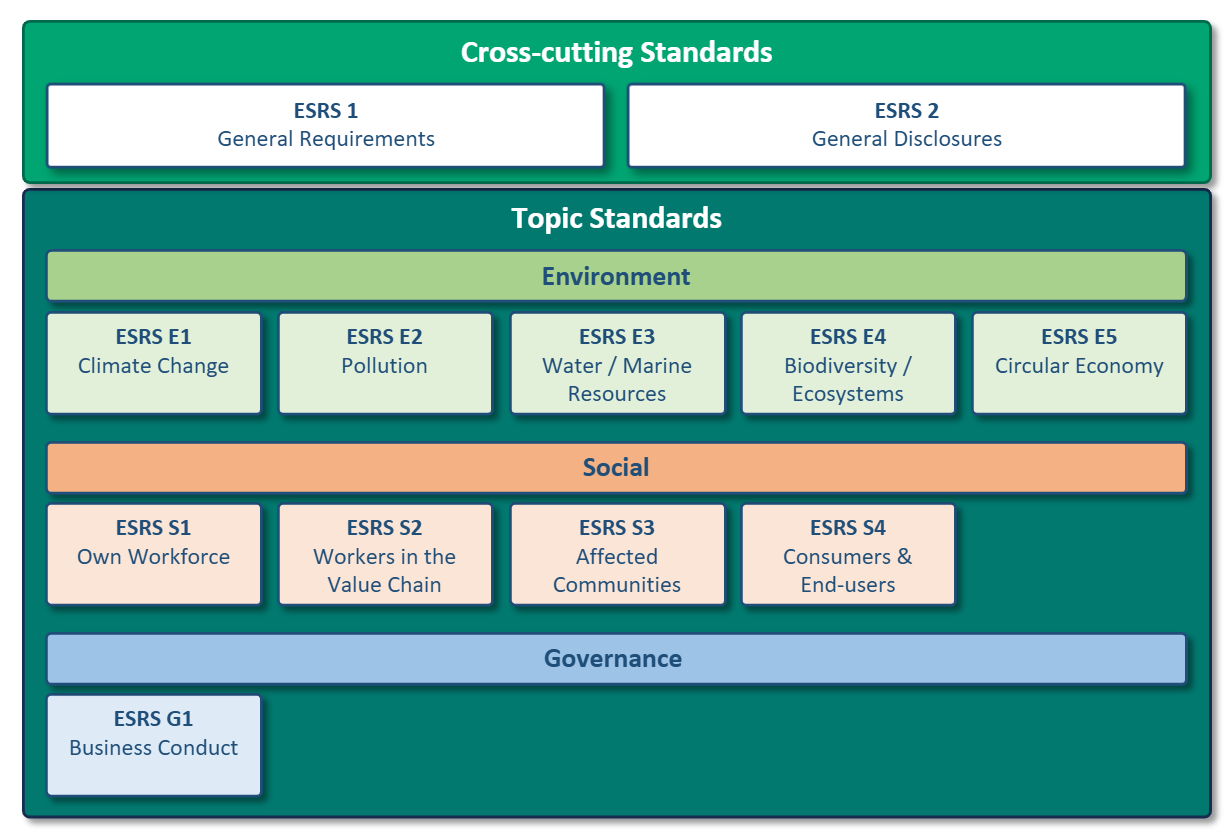In today's business world, corporate sustainability transparency is no longer just an option, but a necessity.
With the Corporate Sustainability Reporting Directive (CSRD) and the European Sustainability Reporting Standards (ESRS), the European Union has created a comprehensive framework, setting new standards for companies to disclose their environmental, social and governance performance.
The CSRD introduces more comprehensive and detailed sustainability reporting for a large number of companies and expands the existing Non-Financial Reporting Directive (NFRD). According to estimates, this will increase the number of companies subject to reporting requirements across the EU from 12,000 to a good 50,000. In addition, the sustainability report will in future be a mandatory part of the management report in order to facilitate access to this information for interested stakeholders.
The introduction of the CSRD will be staggered over the next few years
Large listed companies that have already reported in accordance with the NFRD will report on their 2024 financial year for the first time in 2025.
Large companies (in accordance with HGB) that fulfill two of the following three conditions will report on their 2025 financial year for the first time in 2026:
Listed SMEs (small and medium-sized enterprises) with fewer than 250 employees will report on the 2025/2026 financial years for the first time in 2027.
Large non-EU companies with branches in the EU and a turnover of more than EUR 150 million within the EU will report on the 2028 financial year for the first time in 2029.
The CSRD is also accompanied by corresponding requirements for the implementation of reporting, which are regulated in the European Sustainability Reporting Standards (ESRS).
The ESRS form the framework for reporting and define the specific data points that companies must disclose as part of the CSRD. Integrating these standards into your business processes requires a precise and well-structured approach.
Currently, the ESRS consist of twelve standards, two of which cover general standards and general reporting requirements (ESRS 1) and general company disclosures (ESRS 2) regardless of sector. In addition, there are five environmental and four social standards, as well as a standard on corporate governance, so that all ESG areas are covered.
In the future, further sector-specific standards are also planned for certain industries, which place specially adapted requirements on sustainability reporting.
Our specialized team supports you throughout the entire CSRD reporting process to meet these requirements efficiently and effectively.


A stakeholder analysis is an indispensable component for the successful implementation of CSRD and the implementation of the double materiality analysis. It enables companies to systematically identify the relevant topics, address the needs of their stakeholder groups and develop a credible and effective sustainability strategy. By closely involving stakeholders, companies can ensure that their reporting meets the requirements of the CSRD.
We support you with your stakeholder analysis in several clearly defined steps:

In the IRO (Impact, Risks & Opportunities) screening, we work with you to determine the impacts, risks and opportunities relevant to your company in the area of sustainability. This process is crucial in order to meet the requirements of the CSRD and ESRS and to ensure consistent and transparent reporting. We guide you through the entire screening process so that you can provide the right information at the right time.

Dual materiality not only shows what impact your company has on the environment and society, but also how sustainability aspects influence your company. We help you to carry out this materiality assessment systematically by considering both the positive and negative impacts of your business activities as well as the financial and non-financial risks and opportunities for your company. Through this comprehensive approach, we ensure that your company is aware of all relevant factors and integrates them into its sustainability strategy.

Selecting the right ESRS data points is crucial for transparent and accurate reporting. We support you in identifying the standards and indicators relevant to your company. This includes the environmental as well as the social and governance data required to meet CSRD requirements. With our support, we ensure that you collect the right data that is meaningful and of interest to your stakeholders.

Effective data management is central to the successful implementation of the ESRS and sustainability reporting under the CSRD. We help you develop a solid data management strategy that ensures your data is consistent, up-to-date and complete. This includes not only the collection, but also the validation and analysis of ESG data. In this way, we work with you to ensure that your reporting is based on sound information and complies with regulatory requirements.

Our team will guide you through the entire process of sustainable corporate reporting right up to the final audit by the auditor. We ensure that all CSRD and ESRS requirements are met and that your reporting stands up to external scrutiny. Our experts work closely with you to make the process transparent and efficient so that you can go into the final audit with confidence and certainty.